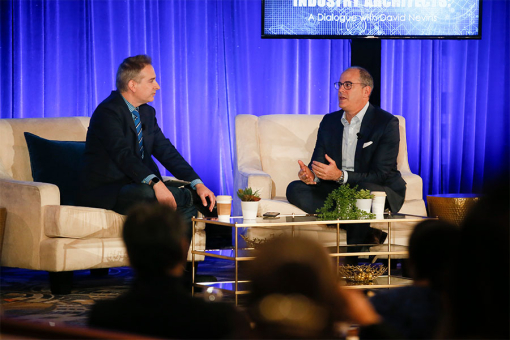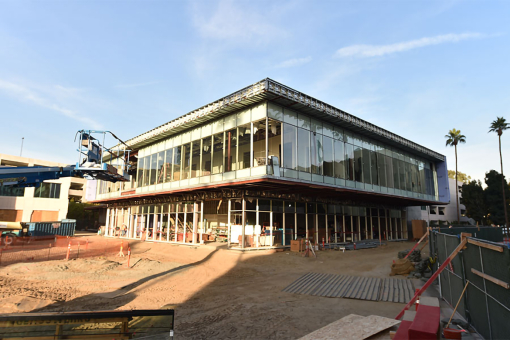For years, the prospects for non-heterosexual characters on television were as grim as the storylines they were given.
"When I was growing up, the three stories that a queer character could have were essentially coming out, contracting HIV/AIDS and dying either from the disease or from homophobia," writer Rob Forman told the crowd at the Television Academy's Saban Media Center, April 30, 2019 in North Hollywood. "So my only narrative as a queer person is 'trudging.' Where's the joy? Where's the life?"
Forman, whose writing credits include Lifetime's Army Wives, CW's iZombie and the indie action/RPG video game Indivisible, moderated the panel discussion "Writing LGBTQ+ Love & Romance on TV" hosted by the Writers Peer Group Executive Committee and introduced by peer group governors Regina Y. Hicks and Judalina Neira.
Joining Forman were panelists Joanna Johnson, executive producer for Freeform's Good Trouble and The Fosters; Ben Corey Jones, writer and producer on HBO's Insecure and showrunner for BET's upcoming Boomerang; Ryan O'Connell, executive story editor on NBC's revival of Will & Grace and writer, producer and star of the Netflix series Special; Our Lady J, writer and producer on Amazon's Transparent and FX's Pose; and Lauren Morelli, writer for Orange is the New Black and writer and executive producer for the Netflix reboot of Tales of the City.
Taking their cue from Forman's reminder of a less aware, less enlightened age of entertainment, the panelists shared their insights on LGBTQ+ storytelling on television, as both watchers and creators.
To convince viewers of the reality of genuine, loving relationships between LGBTQ+ characters, writers need to start by focusing on what's human about them, strengths, vulnerabilities, desires and all.
"There's a lot of times that you see a queer character, but the queer character is loveless," Jones said. "To see that a queer character can actually have love like everybody else is still kind of a novel thing in my opinion."
For Johnson, writing a believable, relatable relationship meant drawing from experience.
"I got to write about our life," Johnson said, recalling her work on The Fosters, which included inspiration from her marriage, adopted children and multiracial family. "There are people who would say to me that is one of the most real, authentic marriages I've seen on TV, regardless of it being two women."
At a time when individuals self-identify with more social categories than ever—or find themselves needing to—intersectionality can strengthen a work's appeal, even broaden it.
O'Connell greets the success of Special, his semi-autobiographical series inspired by his life as a gay man with cerebral palsy, with bemused matter-of-factness. Noting that people seem amazed at the show's popularity, its writer and creator revealed that he anticipated it.
"To me, I was always writing an Arianna Grande pop song," O'Connell said. "When you boil down the things that people want; like, my character just wants the basics, a boyfriend, a healthy relationship with his mom, a job where he's valued…that's not unique, that's just the human condition."
Jones, whose comedy pilot Bros centers on three African American brothers (two of whom are straight, the other gay), and whose Boomerang reboot features a non-sensationalized, sexually fluid character, calls upon that same sense of basic needs to create gratifying work.
"The gay thing is not necessarily the hook of the show," Jones added. "The hook of the show is the heart and the emotion that everyone else is going to relate to and the lens by which we get to see this."
As non-binary identities gain visibility, the issue of portraying them honestly, interestingly and believably grows more critical.
"I think we're really lucky to see more stories that are portraying a lot of sexualities and genders within the binary in a more comfortable way," Morelli said, "but we're still trying to carve out that space for someone that's like, what if we threw that out? What if that binary didn't exist?"
And while television has made great strides in showing fully-formed LGBTQ+ characters who exist to illustrate rather than teach, there are still lessons to share with mainstream viewers. The panelists agreed that realistic dialogue and situations go further than a heavy hand whenever exposition is necessary.
"That gets super-sticky, when you realize you have characters having a conversation just for the sake of educating," Morelli said. "So now you're like, Oh, we have two queer people on television who are just there to educate straight people who don't get it."
For Our Lady J, the first out trans writer to earn a Writers Guild Award nomination, early seasons of Transparent required educating the audience. "It did feel like we couldn't have those nuanced conversations because we were just explaining, 'Just because you like trans women doesn't mean you're gay.' And people were like, 'what?'"
Only a few years later, work on Pose means adding deeper insights to the theme of trans-attraction. "On Pose, it became less about his desire and more about what she wanted, which I really hadn't seen before in a trans character," Our Lady J said. "It became about her desire, and placing the audience in her desire."
The event's question and answer session invited a room full of writers, producers, creators and performers to ask what they can do to portray LGTBQ+ characters and relationships as truthfully as possible.
For one heterosexual writer, infusing her script involving bisexual main characters with authenticity is the main goal of her project.
"Send your script to GLAAD (Gays & Lesbian Alliance Against Defamation) before you send it to any execs," Our Lady J recommended. "They have people there that make sure that writers are getting it right."
The writer appeared to be in the right place at the right time—Academy staff then called attention toward a GLAAD representative in the audience, who spoke with the writer after the event.
"What aren't we seeing yet that we should be seeing?" asked another audience member.
Johnson emphasized the importance of diversity not only in portrayals but behind the scenes. "We were talking about what we're seeing in front, but we need to be seeing this at the studios and networks and in the executive ranks: more diversity."
The evening finished with enthusiastic networking, and the optimism that may have been lacking in past eras of gay-and-lesbian-themed television seemed eagerly at work in the room. For attendees, learning and sharing how to show LGBTQ+ characters living their lives and navigating relationships was openly recognized as a common goal.
Morelli shared gratitude for the progress she's seeing in 2019. "Maybe this is the age of TV that we're living in on some level, where there's so much being made and we're so privileged to be able to tell really specific stories."
In summing up his take on the writer's job, O'Connell shared advice with his characteristically biting delivery.
"I just have to write what's true and honest, and I think that through specificity you get universality. So, I just have to do me and know that I was doing others at the same time, you know what I mean?"
"Wink," Forman punctuated.





